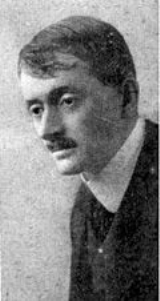
, (1 June 1878 – 12 May 1967) was an English poet and writer, and Poet Laureate of the United Kingdom
from 1930 until his death in 1967. He is remembered as the author of the classic children's novels The Midnight Folk
and The Box of Delights
, and poems, including "The Everlasting Mercy" and "Sea-Fever".
Masefield was born in Ledbury
in Herefordshire
, to Caroline and George Masefield, a solicitor. His mother died giving birth to his sister when Masefield was only six, and he went to live with his aunt.
Quinquireme of Nineveh from distant Ophir,Rowing home to haven in sunny Palestine,With a cargo of ivory,And apes and peacocks,Sandalwood, cedarwood, and sweet white wine.
Out beyond the sunset, could I but find the way,Is a sleepy blue laguna which widens to a bay,And there's the Blessed City -- so the sailors say --The Golden City of St. Mary.![]()
It's a warm wind, the west wind, full of birds' cries;I never hear the west wind but tears are in my eyes.For it comes from the west lands, the old brown hills,And April's in the west wind, and daffodils.
![]()
Will you not come home, brother? you have been long away,It's April, and blossom time, and white is the spray;And bright is the sun, brother, and warm is the rain, -Will you not come home, brother, home to us again?![]()
Oh some are fond of Spanish wine, and some are fond of French,And some’ll swallow tay and stuff fit only for a wench;But I’m for right Jamaica till I roll beneath the bench,Says the old bold mate of Henry Morgan.![]()
In the dark womb where I beganMy mother's life made me a man.Through all the months of human birthHer beauty fed my common earth.I cannot see, nor breathe, nor stir,But through the death of some of her.
![]()
What have I done, or tried, or saidIn thanks to that dear woman dead?Men triumph over women still,Men trample women's rights at will,And man's lust roves the world untamed. O grave, keep shut lest I be shamed.![]()
From '41 to '51I was my folk's contrary son;I bit my father's hand right throughAnd broke my mother's heart in two.![]()
My blood did leap, my flesh did revel,Saul Kane was tokened to the devil.![]()
I, who am dead, have ways of knowingOf the crop of death that the quick are sowing.I, who was Pompey, cry it aloudFrom the dark of death, from the wind blowing.I, who was Pompey, once was proud,Now I lie in the sand without a shroud;I cry to Caesar out of my pain,"Caesar beware, your death is vowed."![]()
What is this creature, Music, save the Art,The Rhythm that the planets journey by?The living Sun-Ray entering the heart,Touching the Life with that which cannot die?
![]()

